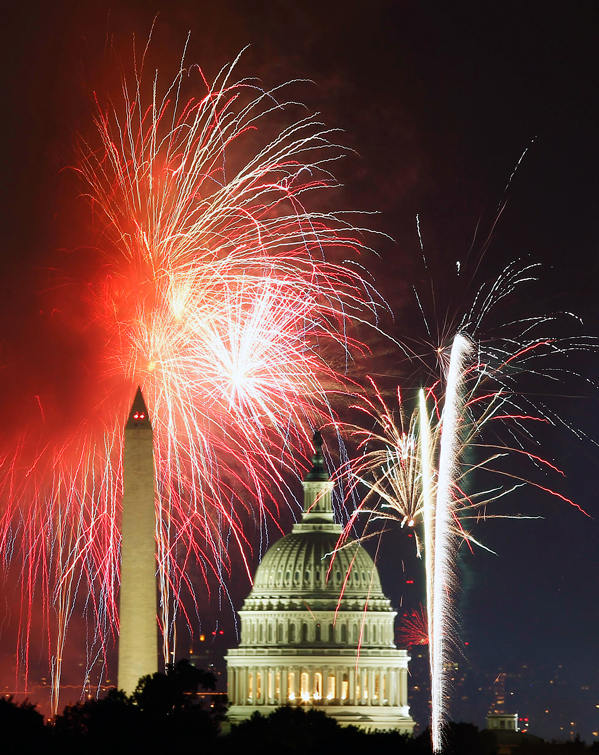by Nancy Frazier O’Brien

WASHINGTON (CNS) – American Catholics must resist unjust laws “as a duty of citizenship and an obligation of faith,” a committee of the U.S. bishops said in a new statement on religious liberty.
Titled “Our First, Most Cherished Liberty,” the 12-page statement by the Ad Hoc Committee on Religious Liberty also calls for “a fortnight for freedom” from June 21, the vigil of the feasts of St. John Fisher and St. Thomas More, to July 4, U.S. Independence Day.
“This special period of prayer, study, catechesis and public action would emphasize both our Christian and American heritage of liberty,” the committee said.
“Dioceses and parishes around the country could choose a date in that period for special events that would constitute a great national campaign of teaching and witness for religious liberty.”
Made public April 12, the document was approved by the U.S. Conference of Catholic Bishops’ Administrative Committee during its March meeting for publication as a committee statement.
The ad hoc committee opened its statement with several “concrete examples” of recent threats to religious liberty, saying that “this is not a theological or legal dispute without real-world consequences.”
Cited first was the Department of Health and Human Services’ mandate that most health plans must include contraception, sterilization and some abortion-inducing drugs free of charge, even if the employer is morally opposed to such services.
“In an unprecedented way, the federal government will both force religious institutions to facilitate and fund a product contrary to their own moral teaching and purport to define which religious institutions are ‘religious enough’ to merit protection of their religious liberty,” the statement said. “These features of the ‘preventive services’ mandate amount to an unjust law.”
Among other examples of “religious liberty under attack” the bishops named:
• Immigration laws in Alabama and other states that “forbid what the government deems ‘harboring’ of undocumented immigrants – and what the church deems Christian charity and pastoral care to those immigrants.”
• An attempt by the Connecticut Legislature in 2009 to restructure Catholic parishes.
• Discrimination against Christian students on college campuses.
• Government actions in Boston, San Francisco, the District of Columbia and the state of Illinois that have “driven local Catholic Charities out of the business of providing adoption or foster care services” because the agencies would not place children with same-sex or unmarried heterosexual couples.
• A New York City rule that bars small church congregations from renting public schools on weekends for worship services, while allowing such rentals by nonreligious groups.
• Changes in federal contracts for human trafficking grants that require Catholic agencies “to refer for contraceptive and abortion services in violation of Catholic teaching.”
The statement quotes the Founding Fathers and the Rev. Martin Luther King Jr. to bolster its arguments.
Rev. King, writing from jail in Birmingham, Ala., in 1963, described an unjust law as one “that is out of harmony with the moral law,” and said he agreed with St. Augustine that “an unjust law is no law at all.”
“An unjust law cannot be obeyed,” the bishops’ statement said. “In the face of an unjust law, an accommodation is not to be sought, especially by resorting to equivocal words and deceptive practices.
“If we face today the prospect of unjust laws, then Catholics in America, in solidarity with our fellow citizens, must have the courage not to obey them,” it added. “No American desires this. No Catholic welcomes it. But if it should fall upon us, we must discharge it as a duty of citizenship and an obligation of faith.”
The bishops also distinguished between conscientious objection and an unjust law.
“Conscientious objection permits some relief to those who object to a just law for reasons of conscience – conscription being the most well-known example,” the committee said. “An unjust law is ‘no law at all.’ It cannot be obeyed, and therefore one does not seek relief from it, but rather its repeal.”
The statement also raised the issue of religious freedom abroad and said “the age of martyrdom has not passed.”
“Assassinations, bombings of churches, torching of orphanages – these are only the most violent attacks Christians have suffered because of their faith in Jesus Christ,” the bishops said. “It is our task to strengthen religious liberty at home, … so that we might defend it more vigorously abroad.”
The statement called on “American foreign policy, as well as the vast international network of Catholic agencies” to make “the promotion of religious liberty an ongoing and urgent priority.”
The bishops assigned special responsibility for advancing religious freedom to several groups:
• Those who hold public office must “protect and defend those fundamental liberties guaranteed by the Bill of Rights,” regardless of their political party.
• Leaders of Catholic hospitals, universities and social service agencies “who may be forced to choose between the good works we do by faith, and fidelity to that faith itself” were encouraged to “hold firm, to stand fast and to insist upon what belongs to you by right as Catholics and Americans.”
• Priests must offer “a catechesis on religious liberty suited to the souls in your care,” a responsibility that is shared with “writers, producers, artists, publishers, filmmakers and bloggers employing all the means of communications.”
In addition to the “fortnight for freedom” June 21 to July 4, the bishops designated the feast of Christ the King – Nov. 25 this year – as “a day specifically employed by bishops and priests to preach about religious liberty, both here and abroad.”
